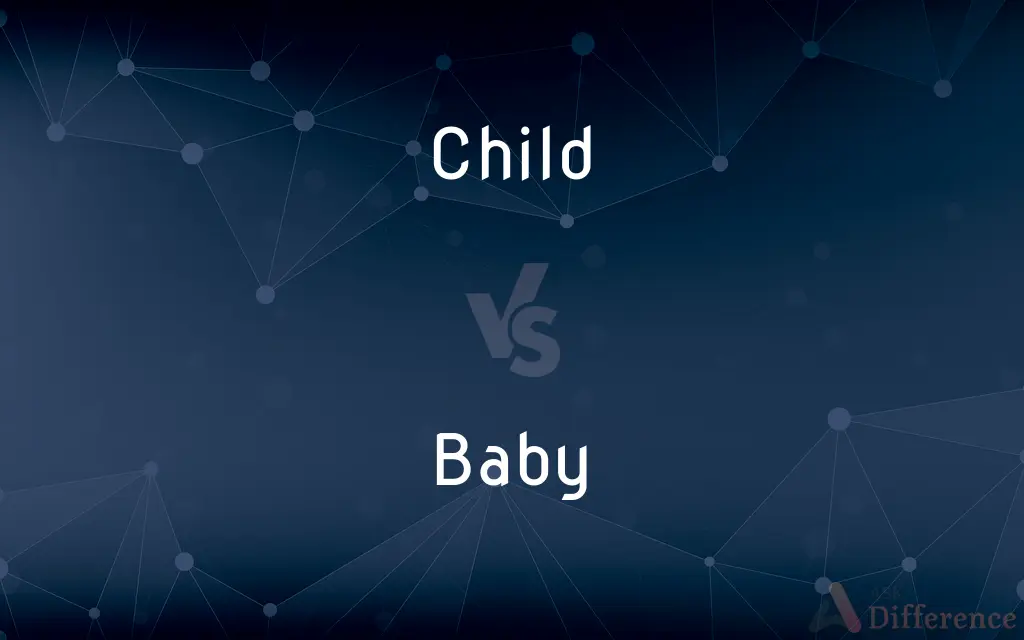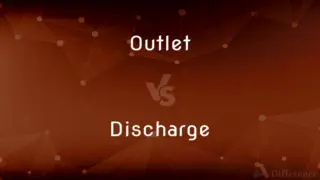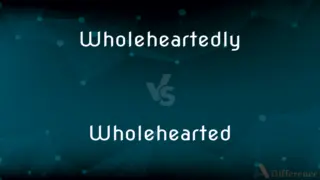Child vs. Baby — What's the Difference?
By Maham Liaqat & Urooj Arif — Updated on March 14, 2024
A baby specifically refers to a very young offspring, typically under 1 year, while a child encompasses a broader age range from infancy through early adolescence.

Difference Between Child and Baby
Table of Contents
ADVERTISEMENT
Key Differences
A child, on the other hand, encompasses a broader age range that includes babies but extends through early adolescence, marking a period of continued growth and development. A baby is a term used to describe a very young offspring, usually from birth up until about 12 months of age, characterized by rapid physical and cognitive development
While babies are highly dependent on adults for basic needs such as feeding, clothing, and care, children gradually gain independence, developing skills like walking, talking, and self-feeding. This transition from dependency to relative independence is a key difference between the two stages.
The term "baby" is often associated with the infant stage, focusing on the earliest period of a human's life, where foundational development occurs. In contrast, "child" covers various developmental stages, including toddlerhood, preschool age, and school age, each with its unique milestones and challenges.
Socially and legally, the distinction between a baby and a child can influence considerations such as childcare, education, and parental responsibilities. For example, babies require more immediate and constant care, while older children engage in educational activities and have different social and emotional needs.
In terms of language development, babies typically progress from cooing and babbling to forming their first words, often around their first birthday. Children continue to develop their language skills rapidly, becoming more proficient in communication and understanding complex language structures.
ADVERTISEMENT
Comparison Chart
Age Range
Birth through early adolescence.
Birth to about 12 months.
Dependency
Gradually gains independence.
High dependency on adults for care
Developmental Stages
Includes toddlerhood, preschool, and school age, with diverse milestones.
Infant stage, focusing on basic growth and development.
Care Needs
Needs vary with age; more engagement in education and social activities.
Requires constant care and attention.
Language Development
Rapid development of language skills and understanding complex language.
Progresses from cooing/babbling to first words.
Compare with Definitions
Child
Engages in educational activities and begins formal schooling.
The child enjoys his time at school and learning new things.
Baby
Characterized by rapid physical and cognitive development.
It's fascinating to watch the baby's developmental milestones.
Child
Develops complex language and cognitive skills.
The child can now express complex ideas and engage in conversations.
Baby
A very young offspring, particularly in the first year of life.
The baby just celebrated her first birthday.
Child
Encompasses a broad age range from infancy through early adolescence.
The child is now entering his school-age years.
Baby
Experiences foundational growth in the infant stage.
The baby is going through significant growth spurts during her infant stage.
Child
Gradually gains independence, developing personal and social skills.
The child is learning to dress himself and make friends.
Baby
Highly dependent on adults for care and needs.
The baby requires constant attention and care from her parents.
Child
Social and emotional development becomes more nuanced.
The child is developing a sense of empathy and understanding emotions.
Baby
Begins to develop basic communication skills like cooing and babbling.
The baby's cooing and babbling are her early forms of communication.
Child
Biologically, a child (plural children) is a human being between the stages of birth and puberty, or between the developmental period of infancy and puberty. The legal definition of child generally refers to a minor, otherwise known as a person younger than the age of majority.
Baby
A very young child; an infant.
Child
A person between birth and puberty.
Baby
An unborn child; a fetus.
Child
A person who has not attained maturity or the age of legal majority.
Baby
The youngest member of a family or group.
Child
An unborn infant; a fetus.
Baby
A very young animal.
Child
An infant; a baby.
Baby
An adult or young person who behaves in an infantile way.
Child
One who is childish or immature.
Baby
A lover or sweetheart.
Child
Someone to whom a specified person is a parent.
Baby
Sweetheart; dear. Used as a term of endearment.
Child
A member of a tribe; descendant
Children of Abraham.
Baby
(Slang) An object of personal concern or interest
Keeping the boat in good repair is your baby.
Child
An individual regarded as strongly affected by another or by a specified time, place, or circumstance
A child of nature.
A child of the Sixties.
Baby
Of or having to do with a baby.
Child
A product or result of something specified
“Times Square is a child of the 20th century” (Richard F. Shepard).
Baby
Infantile or childish.
Child
A person who has not yet reached adulthood, whether natural (puberty), cultural (initiation), or legal (majority).
Go easy on him: he is but a child.
Baby
Small in comparison with others of the same kind
Baby vegetables.
Child
A kid aged 1 to 11 years, whereas neonates are aged 0 to 1 month, infants are aged 1 month to 12 months, and adolescents are aged 12 years to 18 years.
Regular chores can be appropriate for both children and adolescents, given age-appropriate limits on difficulty level and time on task.
Baby
To pamper like a baby; coddle.
Child
(with possessive) One's direct descendant by birth, regardless of age; one's offspring; a son or daughter.
My youngest child is forty-three this year.
His adult children visit him yearly.
Baby
A very young human, particularly from conception or birth to a couple of years old or until walking is fully mastered.
Child
(cartomancy) The thirteenth Lenormand card.
Baby
Any very young animal, especially a vertebrate; many species have specific names for their babies, such as kittens for the babies of cats, puppies for the babies of dogs, and chicks for the babies of birds. See :Category:Baby animals for more.
Child
(figurative) A figurative offspring, particularly:
Baby
Unborn young; a fetus.
When is your baby due?
Child
A person considered a product of a place or culture, a member of a tribe or culture, regardless of age.
The children of Israel.
He is a child of his times.
Baby
A person who is immature, infantile or feeble.
Stand up for yourself – don't be such a baby!
Child
Anything derived from or caused by something.
Baby
A person who is new to or inexperienced in something.
I only qualified as an architect this summer, so I'm still a baby.
Child
(computing) A data item, process, or object which has a subservient or derivative role relative to another.
The child node then stores the actual data of the parent node.
Baby
The lastborn of a family; the youngest sibling, irrespective of age.
Adam is the baby of the family.
Child
Youth of noble birth
Baby
A person's romantic partner.
Child
(mathematics) A subordinate node of a tree.
Baby
A term of endearment used to refer to or address one's girlfriend, boyfriend or spouse.
Too busy thinking about my baby, and I ain't got time for nothing else.
Baby, don't cry.
Child
A female child, a girl.
Baby
(informal) A form of address to a person considered to be attractive.
Hey baby, what are you doing later?
Child
To give birth; to beget or procreate.
Baby
A concept or creation endeared by its creator.
This test program I've designed is my new baby.
Child
A son or a daughter; a male or female descendant, in the first degree; the immediate progeny of human parents; - in law, legitimate offspring. Used also of animals and plants.
Baby
A pet project or responsibility.
You need to talk to John about that – it's his baby.
Child
A descendant, however remote; - used esp. in the plural; as, the children of Israel; the children of Edom.
Baby
An affectionate term for anything.
See my new car here? I can't wait to take this baby for a drive.
Child
One who, by character of practice, shows signs of relationship to, or of the influence of, another; one closely connected with a place, occupation, character, etc.; as, a child of God; a child of the devil; a child of disobedience; a child of toil; a child of the people.
Baby
(archaic) A small image of an infant; a doll.
Child
A noble youth. See Childe.
Baby
One who is new to an identity or community.
Child
A female infant.
A boy or a child, I wonder?
Baby
(of vegetables, etc.) Picked when small and immature (as in baby corn, baby potatoes).
Child
To give birth; to produce young.
This queen Genissa childing died.
It chanced within two days they childed both.
Baby
Newest (overall, or in some group or state), most inexperienced.
Child
A human offspring (son or daughter) of any age;
They had three children
They were able to send their kids to college
Baby
(in the comparative or superlative) Like or pertaining to a baby, in size or youth; small, young.
Child
An immature childish person;
He remained a child in practical matters as long as he lived
Stop being a baby!
Baby
(transitive) To coddle; to pamper somebody like an infant.
Child
A member of a clan or tribe;
The children of Israel
Baby
(transitive) To tend (something) with care; to be overly attentive to (something), fuss over.
Baby
A small image of an infant; a doll.
She clung about his neck, gave him ten kisses,Toyed with his locks, looked babies in his eyes.
Baby
Pertaining to, or resembling, an infant; young or little; as, baby swans.
Baby
To treat like a young child; to keep dependent; to humor; to fondle.
Baby
A very young child (birth to 1 year) who has not yet begun to walk or talk;
Isn't she too young to have a baby?
Baby
Sometimes used as a term of address for attractive young women
Baby
A very young mammal;
Baby rabbits
Baby
The youngest member of a group (not necessarily young);
The baby of the family
The baby of the Supreme Court
Baby
An immature childish person;
He remained a child in practical matters as long as he lived
Stop being a baby!
Baby
A project of personal concern to someone;
This project is his baby
Baby
Treat with excessive indulgence;
Grandparents often pamper the children
Let's not mollycoddle our students!
Common Curiosities
What are some key developmental milestones for babies?
Key milestones for babies include physical growth, cognitive development, and the beginnings of language skills, such as cooing and babbling.
What defines a baby in terms of age?
A baby is defined as a very young offspring, typically from birth up to about 12 months of age.
How does the care needs of a child differ from that of a baby?
While a baby requires constant care and attention, a child's care needs evolve to include educational and social activities alongside basic needs.
What is the significance of the term "child" in describing development?
The term "child" encompasses a broad developmental spectrum, covering various stages from infancy to early adolescence, each with distinct milestones and challenges.
At what age do children typically start formal education?
Children typically start formal education around the age of 5 or 6, depending on the educational system and regulations in their country.
How do babies communicate before they can speak?
Babies communicate through cooing, babbling, facial expressions, and body movements before developing the ability to form words.
How does nutritional needs evolve from a baby to a child?
Nutritional needs evolve from milk-based diets for babies to more varied and solid foods for children, supporting their growth and development.
How does a child's dependency change compared to a baby's?
Unlike a highly dependent baby, a child gradually gains independence, learning to perform tasks and make decisions on their own.
What are some common challenges in transitioning from babyhood to childhood?
Common challenges include adapting to new routines, managing separation anxiety, and navigating the early stages of independence and social relationships.
How is language development supported in early childhood?
Language development is supported through reading, storytelling, engaging conversations, and interactive play, enriching vocabulary and comprehension.
What role does play have in a child's development?
Play is crucial for a child's development, aiding in physical, cognitive, social, and emotional growth through interactive and imaginative activities.
How do social interactions differ between babies and older children?
Babies primarily interact with caregivers, while older children engage in more complex social interactions with peers, expanding their social skills and networks.
What are the implications of early childhood education for children?
Early childhood education lays the foundation for lifelong learning, social skills, and cognitive development, preparing children for formal schooling and beyond.
How do parents and caregivers adapt their approaches as babies grow into children?
Parents and caregivers adapt by gradually shifting from providing intensive care to fostering independence, guiding educational pursuits, and supporting social and emotional development.
What legal considerations differentiate the care of babies from older children?
Legal considerations may include childcare regulations, safety standards, and educational requirements, which vary depending on the child's age and developmental stage.
Share Your Discovery

Previous Comparison
Outlet vs. Discharge
Next Comparison
Wholeheartedly vs. WholeheartedAuthor Spotlight
Written by
Maham LiaqatCo-written by
Urooj ArifUrooj is a skilled content writer at Ask Difference, known for her exceptional ability to simplify complex topics into engaging and informative content. With a passion for research and a flair for clear, concise writing, she consistently delivers articles that resonate with our diverse audience.














































